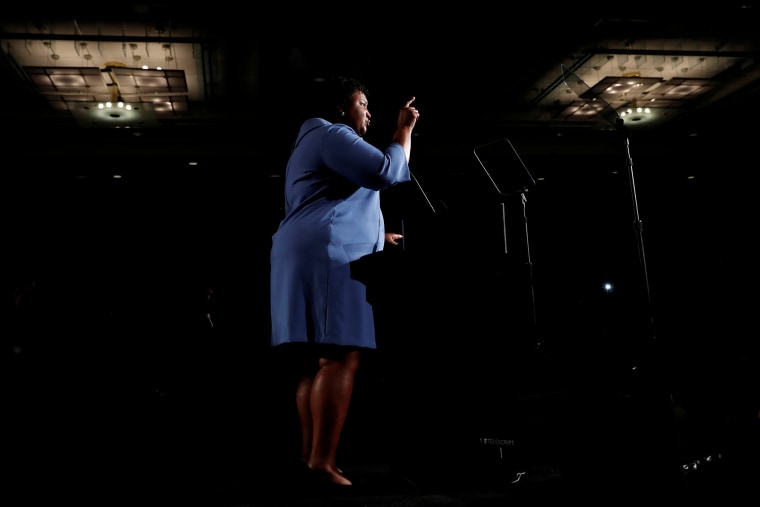WASHINGTON — As a restless left runs up against more moderate party stalwarts both in Congress and on the presidential campaign trail, party leaders, donors, wonks and newly elected Democrats from both camps are gathering Wednesday to pitch their policy ideas.
"I honestly admire the foolhardiness of anyone who wants to referee the Democratic Party," said Neera Tanden, president of the Center for American Progress, which is sponsoring the Ideas Conference.
Tanden said the event, which comes two months after a presidential forum co-hosted by CAP Action Fund, will focus on showcasing rising stars and legislative ideas at the state and congressional level.
“Our goal is to show leaders across the spectrum,” she told NBC News.
The conference comes at a time when the party's identity is up for grabs, leading to a sometimes tense environment among its leading policy lights.
An array of presidential contenders are running on ambitious progressive agendas, and Sen. Bernie Sanders continues to lead a movement calling for a socialist remake of the party. On the other hand, former Vice President Joe Biden has surged to the top of national and state polls while running on a message of bipartisanship and reconciliation.
Much of the early primary campaign has played out in a blizzard of detailed policy papers. To name just a few: Sanders is running on single-payer health care, Sen. Elizabeth Warren on a wealth tax, Sen. Kamala Harris on tax benefits for workers, Sen. Cory Booker on a "baby bond" for every newborn, and former Rep. Beto O'Rourke and Washington Gov. Jay Inslee already have dueling multitrillion-dollar climate plans.
Similar debates are occurring in Congress as House Speaker Nancy Pelosi looks to keep stars on the left like Rep. Alexandria Ocasio-Cortez, D-N.Y., on the same page as moderate members in GOP-leaning districts.
"The party is more liberal than it has been in the past, it's moving in a more liberal direction, but it is also highly practical," Tanden said. "Many progressive voters still believe in unifying the country and want to unify the country against Trumpist extremism."
CAP and other established progressive think tanks haven't been immune to these debates either as they face pressure from new grassroots groups and shoestring-budget policy shops who have gained influence since 2016.
The Green New Deal (which CAP has publicly embraced) was pushed to the forefront by groups like the Sunrise Movement, who have their own small policy shop working to fill in the details. Data For Progress and its co-founder Sean McElwee are looking to influence candidates on climate, housing and immigration from the left (McElwee was a key promoter of the "Abolish ICE" movement) despite not even having an office.
"There's really a flattening out of these hierarchies that, in a lot of ways, organizations like CAP used to rely on," McElwee said.
Pelosi and Rep. Adam Schiff, D-Calif., will appear at the event, both of whom are at the center of a fast-moving debate over whether to initiate impeachment proceedings against President Donald Trump. Tom Steyer, a Democratic megadonor bankrolling an ad campaign calling for Trump's impeachment, will also speak.
Headliners include Stacey Abrams, who is weighing a run for president after an unsuccessful bid for governor in Georgia, as well as New Mexico Gov. Michelle Lujan Grisham and Los Angeles Mayor Eric Garcetti.
Freshman Rep. Katie Porter, D-Calif., a member of the Congressional Progressive Caucus whose campaign was backed by Warren, and Elissa Slotkin of Michigan and Abigail Spanberger of Virginia, both members of the more moderate New Democrat Coalition with national security backgrounds, are among the speakers. Other new members include Jahana Hayes of Connecticut and Sharice Davids of Kansas.
Younger activists are sometimes wary of institutions rooted in traditional party circles and Tanden, a longtime ally of Hillary Clinton, has generated especially strong reactions.
In April, Sanders excoriated CAP after an affiliated news site, ThinkProgress, published a video about his finances that he considered unfair. CAP defended the site’s editorial independence, but Tanden also looked to smooth things over with a statement that called the video "overly harsh."
Tanden is quick to highlight CAP's own influence in the policy debate, citing their experts' work on legislation like the Democratic ethics bill H.R. 1, as well as issues such as universal child care, increasing teacher pay and an optional Medicare plan that have been adopted by 2020 candidates.
Some observers in the Sanders wing also credit CAP with moving somewhat in their direction to meet the times. Tanden herself noted that CAP’s plan for a universal jobs guarantee in distressed communities was "considered more left on the spectrum" even as they advance "other ideas where people may see us as more moderate."
Tanden said she was "excited by the new organizations" in the policy debate, but sees a unique role for CAP in marrying policy ambition and pragmatism.
"The Center for American Progress has always focused on not just having an idea, but having an idea that will make change in people's lives," she said. "The way we make change in people’s lives is for those ideas to make it through both a primary and a general election process and ultimately be adopted in a legislative process."

